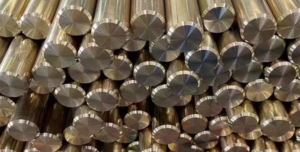Tool steel, as an important branch in the field of metal materials, plays a vital role in industrial manufacturing because of its unique physical and chemical properties. In this article, we will discuss the property of tool steel in detail to ensure that readers can have a comprehensive and in-depth understanding of this metal material.

What is the property of tool steel?
1. High hardness and wear resistance
One of the most notable features of tool steel is its high hardness. After proper heat treatment, tool steel can reach extremely high hardness, such as HRC60 or above, which makes it a key material for manufacturing cutting tools, molds, stamping dies, etc. High hardness means tool steel retains its shape and size when subjected to heavy loads and friction, extending the life of the tool.
In addition, tool steel also has good wear resistance. When cutting at high speed and processing high-temperature hard materials, tool steel can resist wear, maintain the sharpness of the cutting edge, and improve processing efficiency. This characteristic makes tool steel widely used in metal processing, machinery manufacturing, and other fields.
2. High strength and toughness
In addition to high hardness and wear resistance, tool steel also has excellent strength and toughness. Strength refers to the ability of a material to resist deformation and damage when subjected to external forces, while toughness refers to the ability of a material to maintain its integrity when subjected to impact or vibration. The high strength and toughness of tool steel enable it to withstand complex bending stress and impact loads, ensuring that the tool is not easily broken or deformed during use.
3. Good heat treatment performance
The heat treatment properties of tool steel are crucial to its performance. Good heat treatment properties mean that tool steel can maintain stable structure and performance during heating, holding and cooling. This requires tool steel to have a wide quenching temperature range and less quenching sensitivity to reduce the occurrence of heat treatment defects such as overheating, overburning and cracking. At the same time, tool steel should also have good tempering stability to ensure that it can maintain high hardness and good toughness during the tempering process.
4. Excellent process performance
The process properties of tool steel include forging performance, cutting performance and welding performance. Forging performance refers to the plasticity and deformation resistance of the material during the forging process. Good forging performance can ensure that the tool steel obtains the ideal shape and size during the forging process. Cutting performance refers to the machinability of materials during the cutting process. Good cutting performance can improve the processing efficiency of tool steel and reduce costs. Welding performance refers to the weldability of the material during the welding process. Good welding performance can ensure that the tool steel obtains good weld quality and joint strength during the welding process.
5. The role of alloy elements
The properties of tool steel are closely related to the alloying elements they contain. Alloying elements such as tungsten (W), molybdenum (Mo), vanadium (V), chromium (Cr), etc. can improve the hardness, wear resistance, strength and toughness of tool steel. For example, tungsten and molybdenum can improve the hardness and red hardness of tool steel; vanadium can improve the toughness and wear resistance of tool steel; chromium can improve the corrosion resistance and oxidation resistance of tool steel. By adjusting the types and contents of alloying elements, tool steels with different performance characteristics can be obtained to meet different usage needs.
6. Wide range of applications
Because tool steel has the above-mentioned excellent performance characteristics, it has a wide range of applications in metal processing, machinery manufacturing, mold manufacturing, petrochemical industry, aerospace and other fields. For example, in the field of metal processing, tool steel is used to make various cutting tools, drill bits, milling cutters, etc.; in the field of machinery manufacturing, tool steel is used to make various molds, fixtures, stamping dies, etc.; in the petrochemical field, Tool steel is used to manufacture various corrosion-resistant and high-temperature-resistant equipment parts.
Conclusion
To sum up, tool steel plays an important role in industrial manufacturing due to its high hardness, wear resistance, high strength, toughness, and good heat treatment performance and process performance.
Thank you for reading our article and we hope it can help you to have a better understanding of the property of tool steel. If you are looking for tool steel suppliers and manufacturers online now, we would advise you to visit Sino Special Metal.
As a leading supplier of tool steel from Shanghai China, Sino Special Metal offers customers high-quality tool steel products at a very competitive price.




